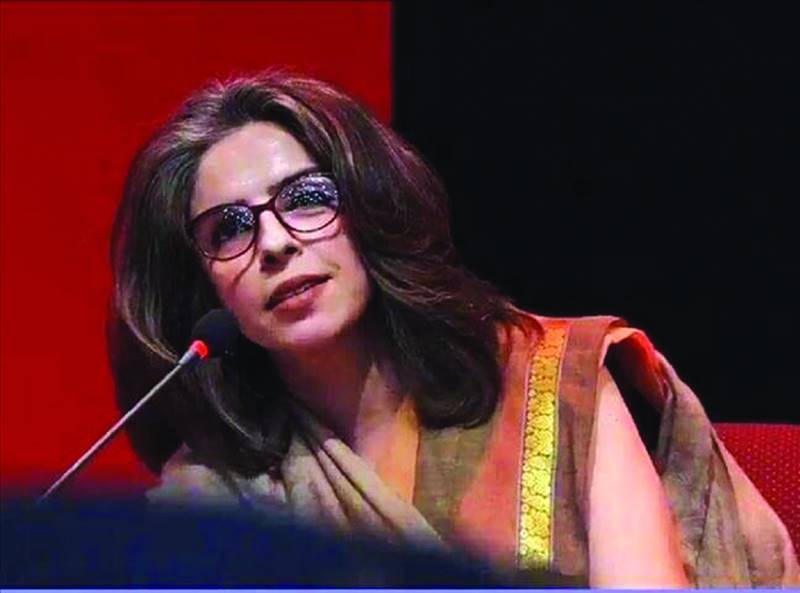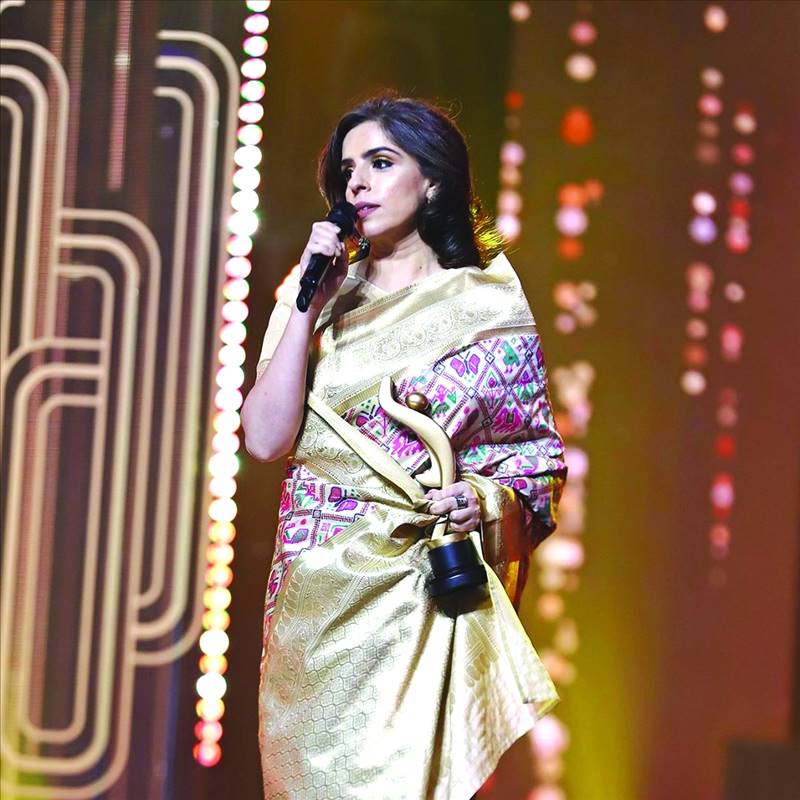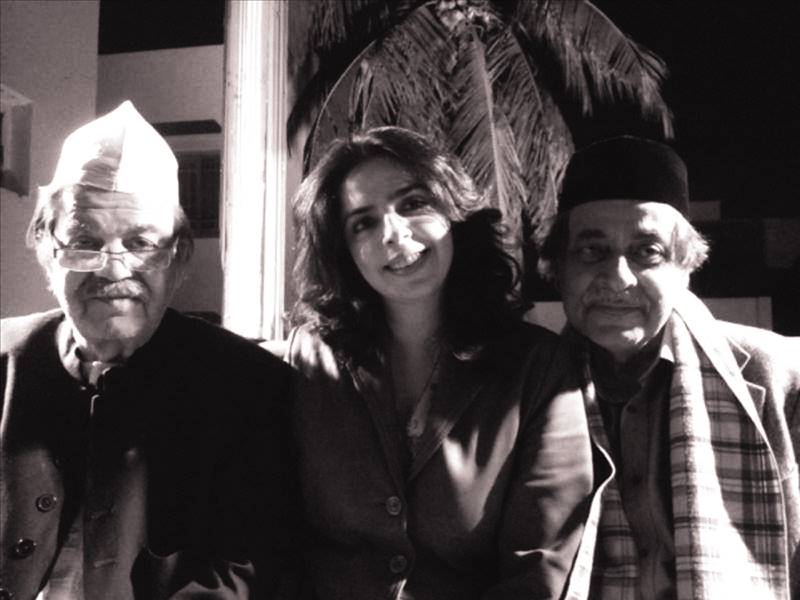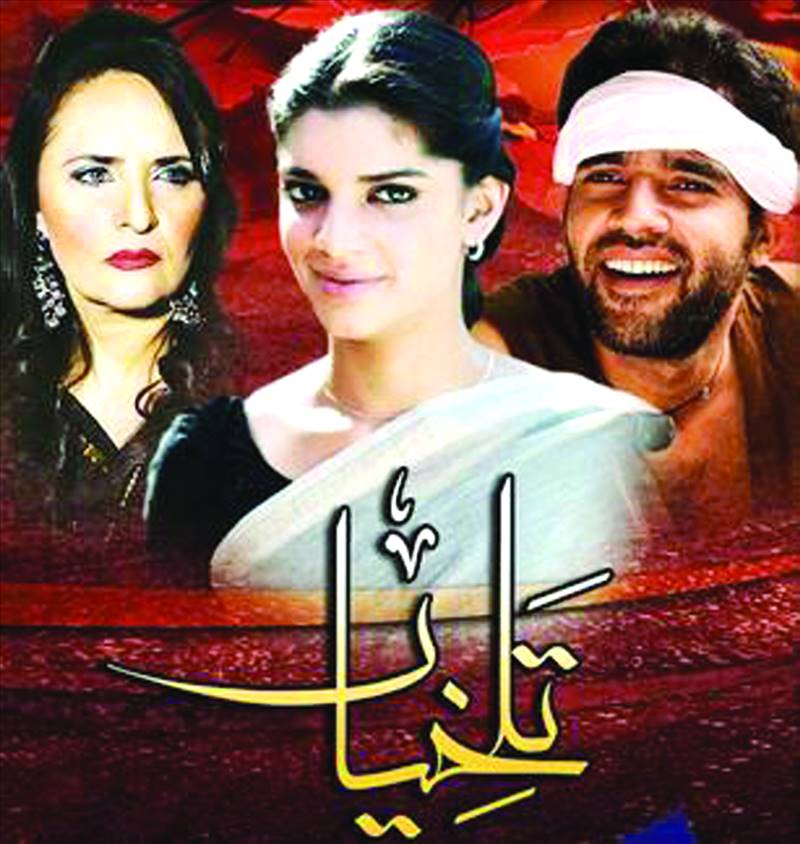
Known for her multi-layered characters and subtle treatment of dark themes, Bee Gul is one of the finest Pakistani screenwriters of the modern times. With the adaptation of The God of Small Things by the name of Talkhiyan to her credit along with Dar Si Jati Hai Sila on sexual harassment and Pehchaan on gas-lighting, Bee Gul has always won hearts with her creative dramatic works. The Friday Times caught up with the drama, long play and film writer to ask her a few questions.
***
Muhammad Ali: You started your writing career with telefilms, a genre which has almost disappeared from our screens. Do you miss writing in the genre? What do you think is the best aspect of it?
Bee Gul: Yes, my first script was a telefilm called “Kaun Qamar Aara?” Even after that, I continued to write long plays and telefilms for a long time and resisted penning down a serial even if I would be approached by producers for the task. In fact, when I wrote my first serial “Talkhiyan” on the request of Razi ud Din Ahmad, I did so because he agreed that he would accept a telefilm as well, something that I liked more. So it was in the desire of getting a chance to write a telefilm after a serial that I wrote “Talkhiyan”. I can’t say much about what appeals to me in the genre, because when I write, I am so deeply engrossed into it that all the mechanical questions regarding writing diminish into the background and what remains at the front is the story. However, it can be said that the things which are said in a short span of time leave a long-lasting effect. Films or telefilms, owing to their short-length, can be easily imbibed and therefore stay with you in comparison to drama serials from which you are able to pick out only bits and pieces. Or, maybe the pattern which I follow while writing a screenplay fits more into the genre of telefilm. Whatever the reason is, whenever I am asked to write a telefilm, a long play or a feature film, I feel a new and different energy inside me.
M.A.: You are an avid reader of both Urdu and English Literature. Which of the two appeals more to your sensibility and helps you with your writing?
B.G.: Urdu Literature was there around me when I was born. It was read, it was venerated and it was abundantly available as my family had an inclination towards it. My maternal side was interested in English Literature and therefore, that too, reached me in the form of books and I availed the opportunity to read it because I was born with the flair for reading and writing. My father then advised me to adopt English Literature as a subject, something I didn’t like back then. Now when I come to think of it, it was a good decision that opened up a world of languages to me, all of them being rich and complete in themselves. Therefore, a comparison cannot be made, as all languages, even French and Persian appeal to me in their respective ways and I enjoy reading all of them.

M.A.: Your projects mostly have open endings. Is it a subjective preference for “afsaanvi” conclusions or is it the audience you want to engage in a thinking process?
B.G.: There definitely is a responsibility on your shoulders while writing for a commercial medium, but at the same time, at this point in my life, my ideologies and my vision cannot be separated from me. Consciously or unconsciously, they seep into my writings and are visible when those pieces of writing are executed on screen. So, when it comes to open endings as well, I don’t believe that there is a finality to things. Life is a process of continuation and no aspect of it can termed as stamping a sense of finiteness to things. The same belief makes its way into my works and you do not see definite endings. As far as the thinking process of the audience is concerned, I would be more than happy to know that they are inclined to reflect after watching my works, for critical thinking is something we aren’t trained to engage ourselves in as a society.
M.A.: You wrote a serial “Dil Aara” with much love and care but it did not gain much attention due to the channel’s problematic policies. Does it make you feel disappointed that an effort went wasted?
B.G.: It isn’t the first time that a project of mine has been treated this way. Channel owners are usually not ready to take my scripts and even when they do, they act as if it was a mistake they committed. So, many of my serials have remained in the background because they never got a good screen. If “Dar Si Jati Hai Sila” became a super-hit, it was because HUM TV owned it and the channel has a good viewership. It definitely hurts but now I know that there is a certain audience that admires my work, and even if through difficulty, it succeeds in gaining access to my dramas.
M.A.: You get invited to a lot of literature festivals. It is also believed that we have less of literature and more of pompous festivals in its name. What is your take on it?
B.G.: Yes, they do turn into commercial events, as the food stalls out there receive more people than the sessions taking place inside. In order to attract more and more people towards literature, you will have to find another way. I myself am not a fan of such festivals, as they are growing in number with more or less the same topics being discussed over and over again, with people being more interested in asserting their opinions. Yes, there is less of intellect and more of crowd and pomp, with absolutely no positive results being yielded in the reading culture. It’s a specific class that backs these festivals, and when you walk into them, that class difference is quite conspicuous.

M.A.: You recently had a meeting with the country’s PM regarding Pakistani drama’s content. Do you think it’s a good sign that our government is showing concern for the arts or is it a subtle exercise of control?
B.G.: Not subtle, but an announced control! And this isn’t something new. The times in which we grew up had a similar, and an even more powerful control over the content, and we are still witnessing the results in the form of mindsets which haven’t grown out of the box. The meeting, to be honest, was a total disappointment, with the vision being very narrow. It is certainly not the state’s duty to tell writers what to write. It is the writers’ duty to decide what they wish to address. Creative people being told how to work does nothing except for blocking the creativity.
M.A.: The season of “Kitni Girhein Baqi Hain” which you supervised touched upon the theme of sexuality as well. How important do you think it is to address sexual orientations?
B.G.: It is highly important to address sexuality, as it is linked with your psyche. Every person has his or her own individuality in which sexual orientation has a significant part to play. To tell them what is right from wrong according to societal constructs and then expecting them to play conventional roles turns them into confused people. When this confusion seeps into the society, problems occur. That’s why it’s important to address sexuality, and not for the sake of TRPs or masala but for the sake of the gravity of the issue.
M.A.: In this era of our drama marked by commercialism, are writers treated with respect or do they become slaves to the businessmen acting as channel heads?
B.G.: Unfortunately, writers are least respected here. The written word has no value. It gives me pain to see directors and producers saying that they made a certain writer write a drama. You can never dictate or teach a creative person. Yes, you can create a conducive environment for creative writers but not instruct them on what they are innately blessed with. This is the first step towards degrading writers; by making them feel that they need to be told what and how to write. This abuse of the writers at the hands of financers can come to an end only if the writers themselves unite and stand against the humiliation. But everyone wants money, after all, and no one is ready to argue with the financers who keep you waiting for hours and hours and when finally meet you, tell you that your script needs revision.

M.A.: Tell us about your upcoming projects. The last time we heard, you had a few films in pipeline.
B.G.: A project which is on shoot and is very close to my heart is a serial being directed by Kashif Nisar in Lahore, called “Raqeeb Se”. Apart from that, my film, “Intezaar” directed by Sakina Samo had its world premiere in New York at the Harlem international Film Festival which ran between the 10th and 14th of September.
M.A.: Is there any message which you would like to send across?
B.G.: Considering the socio-political turmoil we are in, no writer can be apolitical. And if he or she is apolitical and is not being stimulated to write on the crisis going on all around, then something is definitely wrong. It should not be expected of journalists only to write on politics, but from creative writers too, as they possess critical thinking and have the ability to voice the problems of the common people. Writers can and will have to connect with the lower middle class and address their problems instead of acting as saviours and then transferring the same idea of a poor person’s helplessness into drama serials. Instead of telling a poor girl that a rich man will come to her eventual rescue, we need to tell the poor girl to take a stand for herself, wherein lies all the richness and strength of her character.
Muhammad Ali is an M.Phil scholar and a former visiting lecturer at GCU, Lahore. His interest lies in indigenous literature, the specific research areas being the Partition novel, Environmental Literature emerging from South Asia and classical and contemporary Pakistani television drama. His research on Sahira Kazmi’s “Zaib un Nisa” which was a part of his graduation thesis has been presented on various platforms including Olomopolo Media. This interview is a part of a series of interviews in which various Pakistani celebrities including writers, actors and directors will be asked questions regarding their professional work. The writer can be reached at m.ali_aquarius85@yahoo.com.
***
Muhammad Ali: You started your writing career with telefilms, a genre which has almost disappeared from our screens. Do you miss writing in the genre? What do you think is the best aspect of it?
Bee Gul: Yes, my first script was a telefilm called “Kaun Qamar Aara?” Even after that, I continued to write long plays and telefilms for a long time and resisted penning down a serial even if I would be approached by producers for the task. In fact, when I wrote my first serial “Talkhiyan” on the request of Razi ud Din Ahmad, I did so because he agreed that he would accept a telefilm as well, something that I liked more. So it was in the desire of getting a chance to write a telefilm after a serial that I wrote “Talkhiyan”. I can’t say much about what appeals to me in the genre, because when I write, I am so deeply engrossed into it that all the mechanical questions regarding writing diminish into the background and what remains at the front is the story. However, it can be said that the things which are said in a short span of time leave a long-lasting effect. Films or telefilms, owing to their short-length, can be easily imbibed and therefore stay with you in comparison to drama serials from which you are able to pick out only bits and pieces. Or, maybe the pattern which I follow while writing a screenplay fits more into the genre of telefilm. Whatever the reason is, whenever I am asked to write a telefilm, a long play or a feature film, I feel a new and different energy inside me.
M.A.: You are an avid reader of both Urdu and English Literature. Which of the two appeals more to your sensibility and helps you with your writing?
B.G.: Urdu Literature was there around me when I was born. It was read, it was venerated and it was abundantly available as my family had an inclination towards it. My maternal side was interested in English Literature and therefore, that too, reached me in the form of books and I availed the opportunity to read it because I was born with the flair for reading and writing. My father then advised me to adopt English Literature as a subject, something I didn’t like back then. Now when I come to think of it, it was a good decision that opened up a world of languages to me, all of them being rich and complete in themselves. Therefore, a comparison cannot be made, as all languages, even French and Persian appeal to me in their respective ways and I enjoy reading all of them.

M.A.: Your projects mostly have open endings. Is it a subjective preference for “afsaanvi” conclusions or is it the audience you want to engage in a thinking process?
B.G.: There definitely is a responsibility on your shoulders while writing for a commercial medium, but at the same time, at this point in my life, my ideologies and my vision cannot be separated from me. Consciously or unconsciously, they seep into my writings and are visible when those pieces of writing are executed on screen. So, when it comes to open endings as well, I don’t believe that there is a finality to things. Life is a process of continuation and no aspect of it can termed as stamping a sense of finiteness to things. The same belief makes its way into my works and you do not see definite endings. As far as the thinking process of the audience is concerned, I would be more than happy to know that they are inclined to reflect after watching my works, for critical thinking is something we aren’t trained to engage ourselves in as a society.
“There definitely is a responsibility on your shoulders while writing for a commercial medium, but at the same time, at this point in my life, my ideologies and my vision cannot be separated from me”
M.A.: You wrote a serial “Dil Aara” with much love and care but it did not gain much attention due to the channel’s problematic policies. Does it make you feel disappointed that an effort went wasted?
B.G.: It isn’t the first time that a project of mine has been treated this way. Channel owners are usually not ready to take my scripts and even when they do, they act as if it was a mistake they committed. So, many of my serials have remained in the background because they never got a good screen. If “Dar Si Jati Hai Sila” became a super-hit, it was because HUM TV owned it and the channel has a good viewership. It definitely hurts but now I know that there is a certain audience that admires my work, and even if through difficulty, it succeeds in gaining access to my dramas.
M.A.: You get invited to a lot of literature festivals. It is also believed that we have less of literature and more of pompous festivals in its name. What is your take on it?
B.G.: Yes, they do turn into commercial events, as the food stalls out there receive more people than the sessions taking place inside. In order to attract more and more people towards literature, you will have to find another way. I myself am not a fan of such festivals, as they are growing in number with more or less the same topics being discussed over and over again, with people being more interested in asserting their opinions. Yes, there is less of intellect and more of crowd and pomp, with absolutely no positive results being yielded in the reading culture. It’s a specific class that backs these festivals, and when you walk into them, that class difference is quite conspicuous.

M.A.: You recently had a meeting with the country’s PM regarding Pakistani drama’s content. Do you think it’s a good sign that our government is showing concern for the arts or is it a subtle exercise of control?
B.G.: Not subtle, but an announced control! And this isn’t something new. The times in which we grew up had a similar, and an even more powerful control over the content, and we are still witnessing the results in the form of mindsets which haven’t grown out of the box. The meeting, to be honest, was a total disappointment, with the vision being very narrow. It is certainly not the state’s duty to tell writers what to write. It is the writers’ duty to decide what they wish to address. Creative people being told how to work does nothing except for blocking the creativity.
M.A.: The season of “Kitni Girhein Baqi Hain” which you supervised touched upon the theme of sexuality as well. How important do you think it is to address sexual orientations?
B.G.: It is highly important to address sexuality, as it is linked with your psyche. Every person has his or her own individuality in which sexual orientation has a significant part to play. To tell them what is right from wrong according to societal constructs and then expecting them to play conventional roles turns them into confused people. When this confusion seeps into the society, problems occur. That’s why it’s important to address sexuality, and not for the sake of TRPs or masala but for the sake of the gravity of the issue.
“It should not be expected of journalists only to write on politics, but from creative writers too”
M.A.: In this era of our drama marked by commercialism, are writers treated with respect or do they become slaves to the businessmen acting as channel heads?
B.G.: Unfortunately, writers are least respected here. The written word has no value. It gives me pain to see directors and producers saying that they made a certain writer write a drama. You can never dictate or teach a creative person. Yes, you can create a conducive environment for creative writers but not instruct them on what they are innately blessed with. This is the first step towards degrading writers; by making them feel that they need to be told what and how to write. This abuse of the writers at the hands of financers can come to an end only if the writers themselves unite and stand against the humiliation. But everyone wants money, after all, and no one is ready to argue with the financers who keep you waiting for hours and hours and when finally meet you, tell you that your script needs revision.

M.A.: Tell us about your upcoming projects. The last time we heard, you had a few films in pipeline.
B.G.: A project which is on shoot and is very close to my heart is a serial being directed by Kashif Nisar in Lahore, called “Raqeeb Se”. Apart from that, my film, “Intezaar” directed by Sakina Samo had its world premiere in New York at the Harlem international Film Festival which ran between the 10th and 14th of September.
M.A.: Is there any message which you would like to send across?
B.G.: Considering the socio-political turmoil we are in, no writer can be apolitical. And if he or she is apolitical and is not being stimulated to write on the crisis going on all around, then something is definitely wrong. It should not be expected of journalists only to write on politics, but from creative writers too, as they possess critical thinking and have the ability to voice the problems of the common people. Writers can and will have to connect with the lower middle class and address their problems instead of acting as saviours and then transferring the same idea of a poor person’s helplessness into drama serials. Instead of telling a poor girl that a rich man will come to her eventual rescue, we need to tell the poor girl to take a stand for herself, wherein lies all the richness and strength of her character.
Muhammad Ali is an M.Phil scholar and a former visiting lecturer at GCU, Lahore. His interest lies in indigenous literature, the specific research areas being the Partition novel, Environmental Literature emerging from South Asia and classical and contemporary Pakistani television drama. His research on Sahira Kazmi’s “Zaib un Nisa” which was a part of his graduation thesis has been presented on various platforms including Olomopolo Media. This interview is a part of a series of interviews in which various Pakistani celebrities including writers, actors and directors will be asked questions regarding their professional work. The writer can be reached at m.ali_aquarius85@yahoo.com.

